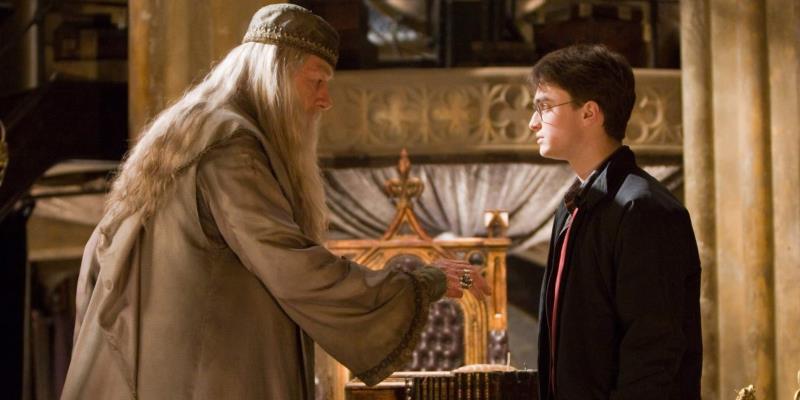
A friend of mine (in real life and on Facebook) issued me one of those Facebook challenges, in this case to list the top 10 books that had been most influential on me. I usually ignore those kinds of things, but I knew this one would be a ton of fun, so I decided to do it and to make a blog post out of it.
First, I have to say that as a writer there’s just no way I can limit my selection to only 10. To play within the rules, however, I picked the top 10 and then put the rest in an “honorable mention” category. Secondly, I thought it was fun to divide the books into three categories: childhood (up through the end of middle school), high school, and adulthood. I’m going to list the books in the order I read them to the best of my memory.
And yeah, I get that it’s a little unusual to claim that books I’ve read in the last few years are among the most influential in my life. How can I really be sure? Of course I can’t. There’s some guess-work involved, but the idea that I’m going to be significantly changing as a person no matter how old I am is important to me. Maybe it’s more of an aspiration than a fact, but I’d like to think I’ll never know what the most influential books will be, ’cause it could be the one I’m reading today, or even one that I’m going to read 10 or 20 or more years in the future. So, with those notes, let’s get started.
Childhood
The Old Testament (1986)
 No, I wasn’t reading the Old Testament in 1986, which was before I started school. I couldn’t even read. But I was listening to them on audiobook. My family was very poor back in those days, and a hand-me down collection of Old Testament audio cassettes was one of the few things with which I could entertain myself. We had a pair of headphones with a really, really long extension cord so even before I could read I would just sit quietly playing with my toy cars and listening to stories about God telling Abraham to sacrifice his soon Isaac. Take that, Baby Einstein.
No, I wasn’t reading the Old Testament in 1986, which was before I started school. I couldn’t even read. But I was listening to them on audiobook. My family was very poor back in those days, and a hand-me down collection of Old Testament audio cassettes was one of the few things with which I could entertain myself. We had a pair of headphones with a really, really long extension cord so even before I could read I would just sit quietly playing with my toy cars and listening to stories about God telling Abraham to sacrifice his soon Isaac. Take that, Baby Einstein.
Truth be told, I’m sure it was probably a sanitized version of the Old Testament. I can’t remember any details. It did make enough of an impression that, one day at dinner, I solemnly told my dad not to marry any Canaanite women. Sure, I knew he wasn’t exactly in the marriage market, but it seemed really important so I thought it was better to be safe than sorry.
I can’t rightly say exactly what influence all this fire-and-brimstone had on a young and impressionable Nathaniel. I think most of the violence went right over my head. What stuck with me, more than anything else, was just this overriding sense that words matter. That the things written down in books could be a big deal. Because I had picture books and learn-to-read books and all that kind of stuff, but I also had the Old Testament. I didn’t really understand it, but I could tell this was a weighty text. So I knew, right at the start, that books could be more than cute and frivolous.
Tom Swift in the Caves of Nuclear Fire by Victor Appleton (1989)
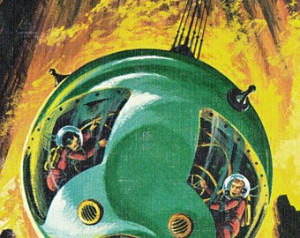 Most of the books I read as a young kid were mysteries. I read dozens and dozens of Hardy Boys and several British series like the Fabulous Five. But the books that stand out the most in my memory are from the Tom Swift, Jr. series.[ref]This series, started in the patriotic 1950’s, was a continuation of the original Tom Swift stories dating back to 1910.[/ref] The first influence is obvious: Tom Swift, Jr. launched my life-long love of science fiction. After thousands of pages of contemporary mystery, the breathtaking scope of these novels filled me with wonder. They also had a really, really strange prose style, however, like “Tom Swifties.” This refers to the way the authors (writing under the name Victor Appleton) went to great lengths to avoid using the plain word “said” in dialogue. Either other phrases were used, or “said” was dressed up in some way: “We must hurry,” said Tom Swiftly. Get it? ‘Cause his name is “Swift”? I could get that, even when I was 8 years old. So in addition to introducing me to sci-fi, the books also taught me that writing wasn’t just a method of conveying meaning. It was itself something you could play with.
Most of the books I read as a young kid were mysteries. I read dozens and dozens of Hardy Boys and several British series like the Fabulous Five. But the books that stand out the most in my memory are from the Tom Swift, Jr. series.[ref]This series, started in the patriotic 1950’s, was a continuation of the original Tom Swift stories dating back to 1910.[/ref] The first influence is obvious: Tom Swift, Jr. launched my life-long love of science fiction. After thousands of pages of contemporary mystery, the breathtaking scope of these novels filled me with wonder. They also had a really, really strange prose style, however, like “Tom Swifties.” This refers to the way the authors (writing under the name Victor Appleton) went to great lengths to avoid using the plain word “said” in dialogue. Either other phrases were used, or “said” was dressed up in some way: “We must hurry,” said Tom Swiftly. Get it? ‘Cause his name is “Swift”? I could get that, even when I was 8 years old. So in addition to introducing me to sci-fi, the books also taught me that writing wasn’t just a method of conveying meaning. It was itself something you could play with.
The Tripods Trilogy by John Christopher – 1992
These books blew my young mind. Post-apocalyptic, alien-resistance, teenage freedom fighters? Yes, please. Think the orignial Red Dawn meets The War of the Worlds and you’ve got a good notion of the plot and tone of these stories.
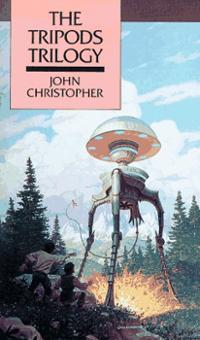 There are still so many scenes from these books[ref]The White Mountains, The City of Gold and Lead, and The Pool of Fire[/ref] that I can vividly recall today. Here’s just one: a city that would give criminals sentenced to death a horse and set them free. If they managed to outrun the tripods (giant, three-legged robots controlled by the aliens) then good for them. But, as the young protagonists watched in horror, even the bravest and most skilled horsemen were going to be caught–impaled on one of the metal tentacles of the towering tripods–and left to die in the fields in front of the town. There were so many awesome themes in this book, and such great sci-fi world-building, but what hit hardest of all was the final sacrifice of one of the main characters in the closing pages of the last book. It was the first time I cried reading a book, and so I learned something new. I learned how deeply a book could make you feel.
There are still so many scenes from these books[ref]The White Mountains, The City of Gold and Lead, and The Pool of Fire[/ref] that I can vividly recall today. Here’s just one: a city that would give criminals sentenced to death a horse and set them free. If they managed to outrun the tripods (giant, three-legged robots controlled by the aliens) then good for them. But, as the young protagonists watched in horror, even the bravest and most skilled horsemen were going to be caught–impaled on one of the metal tentacles of the towering tripods–and left to die in the fields in front of the town. There were so many awesome themes in this book, and such great sci-fi world-building, but what hit hardest of all was the final sacrifice of one of the main characters in the closing pages of the last book. It was the first time I cried reading a book, and so I learned something new. I learned how deeply a book could make you feel.
The Lord of the Rings by J. R. R. Tolkien – 1993
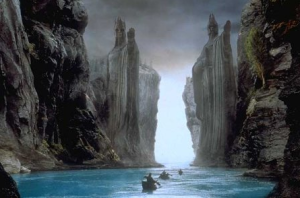 I can still remember exactly where I was when I read The Lord of the Rings for the first time: in my family’s pop-up camper in a campground in north-eastern Tennessee called Warrior’s Path. And, as I’ve recently written about, the scene that stood out the most to me at the time was the relatively inconsequential passage where Frodo and The Fellowship sail past the Argonath, only scant pages before Boromir’s betrayal and the breaking of the Fellowship. I don’t know why my memory of The Two Towers is so much stronger than my memories of The Fellowship of the Ring or The Return of the King, but it is. There was the Argonath, and then of course there was the sound of Boromir’s horn, defiant to the end, as he died a hero despite his faults. I read The Lord of the Rings several more times over the years, and my dad even read the entire trilogy out loud to me when I was a teenager just because it was something fun for us to do together. So LotR influenced me in a lot of ways but, already an aspiring writer by that time, Tolkien mostly taught me about the sacred art of world-building. When a writer really pours himself into creating his world, he creates something real. I know I haven’t lived up to that in my own writing, but it’s always been my guiding star, and I still hope to be a worthy disciple of sub-creation.
I can still remember exactly where I was when I read The Lord of the Rings for the first time: in my family’s pop-up camper in a campground in north-eastern Tennessee called Warrior’s Path. And, as I’ve recently written about, the scene that stood out the most to me at the time was the relatively inconsequential passage where Frodo and The Fellowship sail past the Argonath, only scant pages before Boromir’s betrayal and the breaking of the Fellowship. I don’t know why my memory of The Two Towers is so much stronger than my memories of The Fellowship of the Ring or The Return of the King, but it is. There was the Argonath, and then of course there was the sound of Boromir’s horn, defiant to the end, as he died a hero despite his faults. I read The Lord of the Rings several more times over the years, and my dad even read the entire trilogy out loud to me when I was a teenager just because it was something fun for us to do together. So LotR influenced me in a lot of ways but, already an aspiring writer by that time, Tolkien mostly taught me about the sacred art of world-building. When a writer really pours himself into creating his world, he creates something real. I know I haven’t lived up to that in my own writing, but it’s always been my guiding star, and I still hope to be a worthy disciple of sub-creation.
Honorable Mention
I read a lot of books as a kid. Here are some others that I can’t bear to not mention at all:
- Redwall by Brian Jacques (1991)
I really loved this children’s classic, and I even met Brian Jacques when he came to a public library for a book signing. I still have my signed copy, even though it’s a falling-apart paperback at this point. Meeting an author in the flesh was a big moment for me, even though I failed to prevent two bullies from butting in front of my sister in the book signing line. Mr. Jacques scolded them and sent them to the back of the line and then gave me a look to let me know I’d failed as a big brother. - The Deptford Mice Trilogy by Robin Jarvis (1991)
These were the darkest books I’d read to that date, but also incredibly engrossing. I’ve thought about the limits of darkness in fiction ever since then. - Watership Down by Richard Adams (1992)
It’s impossible to tell someone who hasn’t read Watership Down how good a book about rabbits can be, and–I was surprised to learn–if you tell them that there’s a Simon and Garfunkel song based on the book it doesn’t help.[ref]The song is “Bright Eyes,” by the way, and it’s a Garfunkel sans Simon song. It was really written, by Mike Batt, for the animated adaptation of the book (which I haven’t seen). Listen here. Read more about it here.[/ref] - The Dark is Rising by Susan Cooper (1993)
Definitely one of the most immersive and defining series of my childhood. Also kicked off a Celtic-fantasy binge that lasted for a couple of years. - A Wrinkle in Time by Madeleine L’Engle (1994)
I”m only fully appreciating L’Engle’s gifts as an adult. The older I get, the more I think it is female authors–L’Engle, Bujold, Cherryh, and Le Guin–who are the truest masters of sci-fi.
High School
Dune by Frank Herbert (1995)
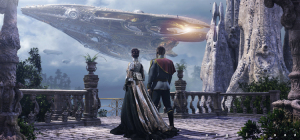 I have never, ever forgotten the lesson of the Gom Jabbar: we human beings are not rational creatures. Our rational minds contend with our animal natures and, more often than not, it is the animal that wins. In recent years this has become well-known with all kind of research on cognitive biases and with Jonathan Haidt’s example of the elephant and the rider, but the truth of it hit me hardest when I read the test that young Paul Atreides faced: one hand in a box that created the sensation of unbearable pain while a needle was poised at his neck, ready to deliver a fatal toxin if he withdrew his hand from the box. Frank Herbert’s masterpiece was also the defining example of the lesson that there is a place for religion-as a personal motivation, as a social force, as a part of the setting–in fiction.
I have never, ever forgotten the lesson of the Gom Jabbar: we human beings are not rational creatures. Our rational minds contend with our animal natures and, more often than not, it is the animal that wins. In recent years this has become well-known with all kind of research on cognitive biases and with Jonathan Haidt’s example of the elephant and the rider, but the truth of it hit me hardest when I read the test that young Paul Atreides faced: one hand in a box that created the sensation of unbearable pain while a needle was poised at his neck, ready to deliver a fatal toxin if he withdrew his hand from the box. Frank Herbert’s masterpiece was also the defining example of the lesson that there is a place for religion-as a personal motivation, as a social force, as a part of the setting–in fiction.
Speaker for the Dead by Orson Scott Card (1996)
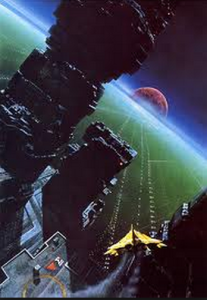 I’ve seen Ender’s Game make the list for a lot of people, and there is no doubt that I liked Ender’s Game more as a kid. I reread it several times, and I didn’t reread Speaker for the Dead until after I was 30. But it has always been Orson Scott Card’s horrific inversion of the crucifixion that has haunted me, delving into the most painful and the most tender aspects of Christianity in general and of Mormonism in particular. Speaker for the Dead is not a fun book, but it is a masterpiece, and it showed me another way in which religion can have a place in fiction: as spiritual meditation, as an exercise of strained faith, as worship.
I’ve seen Ender’s Game make the list for a lot of people, and there is no doubt that I liked Ender’s Game more as a kid. I reread it several times, and I didn’t reread Speaker for the Dead until after I was 30. But it has always been Orson Scott Card’s horrific inversion of the crucifixion that has haunted me, delving into the most painful and the most tender aspects of Christianity in general and of Mormonism in particular. Speaker for the Dead is not a fun book, but it is a masterpiece, and it showed me another way in which religion can have a place in fiction: as spiritual meditation, as an exercise of strained faith, as worship.
The Book of Mormon (1997)
I sort of roll my eyes when people put works of scripture on these lists. Yes, we get it, you’re religious. And here I am with two. That’s ’cause I decided my reaction was just me being too cool for my own God. Which isn’t cool. And the reality is that the Book of Mormon has probably been the single most influential book of my life. I certainly hope it has, in any case. I may have read the Book of Mormon before 1997, but this is the first read-through that I can remember. It’s the read through when I actually decided that I had to know, for myself, if it was true. If I was going to be a Mormon. So I did the Mormon thing: I read the Book of Mormon and then I prayed to know if it was true. I didn’t get an immediate answer or an obvious answer. But I got something, and it was enough to keep my going. My faith has changed a lot over the years, and other things have become more important to my faith than the Book of Mormon[ref]Foremost among them: prayer and a personal relationship with God[/ref], but that was the summer where I set off on my own faith journey, trying to find spiritual independence from my parents for the first time. I’m lucky and grateful that the independence didn’t entail a separation. We don’t see eye-to-eye on every issue, but I’m proud of the work they both do, and deeply grateful that we share a common faith. It’s a faith we couldn’t share if it weren’t for the fact that each of us is willing to abandon it if we don’t believe it to be true.
Honorable Mention
- The Kestrel by Lloyd Alexander (1995)
The second in Lloyd Alexander’s series that started with The Beggar Queen, this book was a stark departure from his usual light-hearted fare. The anti-hero has become trend to the point of cliche in entertainment these days, but this was my first experience with anything like it, and it made me think. It was my introduction to ethics and political philosophy in fiction, I suppose. - The Damned Trilogy by Alan Dean Foster (1996)
If Tom Swift was my first experience with sci-fi, this trilogy has become my personal paragon of sci-fi. It’s fun, exciting space opera that tries to ask big questions and tell a real story about real people. I’ve read more sophisticated and better-written fiction since then, but this will always have a special place in my heart as my re-introduction to the genre and perhaps my first introduction to space opera. - Small Gods by Terry Pratchett (1997)
Douglas Adams’ Hithchiker’s Guide series is funny, but the kind of hilarious writing will always be Terry Pratchett for me. Small Gods was the first book I read by him, and is still the funniest. I laughed so hard that I physically couldn’t hold the book several times. Not all of his works are that funny, and I’m not sure how the humor will hold up now that I’m older, but I’ll also mention two other greats from this time period: Soul Music and Reaper Man. I need to give them a fresh look soon. - Nobody’s Son by Sean Stewart (1999)
I’ve never heard anyone else talk about this book or seen it in any list, but of all the honorable mentions, this one is the closest to making the cut. I’ve seen lots of “subverting the fairy tale” stories since, but none that impressed me the way this one did. It’s a story about what happens after the plucky farm boy slays the evil what’s-it and wins the princess’ hand. How dreams that come true stop being dreams, and what we can do in the after math. I need to re-read this one, too.
Adulthood
Harry Potter by J. K. Rowling (2007)
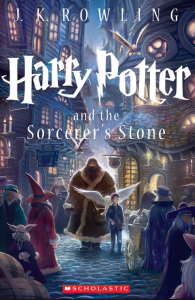 Does this one really need an explanation? My mum started reading the books to the family when I was still in high school. Then I went on a mission, came home, got married, and the last book came out. Harry Potter spans the end of my childhood and the beginning of my life as an adult. I have no idea how many times I’ve listened to Jim Dale’s rendition of the books on audio, but it’s a lot. I’ve learned an incredible amount about writing and about world-building, but more than anything else, J. K. Rowling reminded me of the visceral emotional reality of reading in a way that I hadn’t felt since I was a young child. These books are truly magical.
Does this one really need an explanation? My mum started reading the books to the family when I was still in high school. Then I went on a mission, came home, got married, and the last book came out. Harry Potter spans the end of my childhood and the beginning of my life as an adult. I have no idea how many times I’ve listened to Jim Dale’s rendition of the books on audio, but it’s a lot. I’ve learned an incredible amount about writing and about world-building, but more than anything else, J. K. Rowling reminded me of the visceral emotional reality of reading in a way that I hadn’t felt since I was a young child. These books are truly magical.
Changes by Jim Butcher (2010)
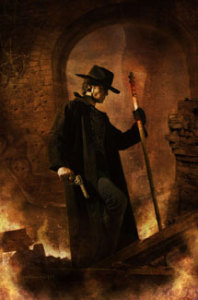 This book represents the entire Dresden Files series. As anyone who follows me on Facebook knows, I love this series with a passion that might not be entirely healthy. I don’t think they are the best-written books. The obsession with sex and with over-explaining both grate, but despite this the books speak to me on a deep, visceral level about the things that matter most. “He died doing the right thing,” is the inscription an evil vampire puts on the protagonists tombstone, and it sort of defines the entire series. That and little old cliches like loyalty, and friendship, and forgiveness, and trust, and family. This book has, without doubt, the best battle scene I’ve ever read. It also has, without doubt, the most tragic death scene I’ve ever read. One is fun, the other left me in tears.
This book represents the entire Dresden Files series. As anyone who follows me on Facebook knows, I love this series with a passion that might not be entirely healthy. I don’t think they are the best-written books. The obsession with sex and with over-explaining both grate, but despite this the books speak to me on a deep, visceral level about the things that matter most. “He died doing the right thing,” is the inscription an evil vampire puts on the protagonists tombstone, and it sort of defines the entire series. That and little old cliches like loyalty, and friendship, and forgiveness, and trust, and family. This book has, without doubt, the best battle scene I’ve ever read. It also has, without doubt, the most tragic death scene I’ve ever read. One is fun, the other left me in tears.
On Killing by Lt. Colonel Dave Grossman (2013)
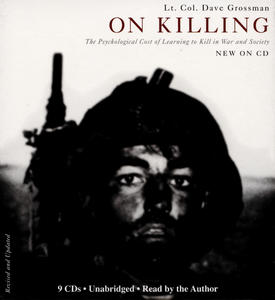 This is the first non-literary book to make it on my list.[ref]Scripture counts as literature.[/ref] In reality, however, I’ve been reading a lot of non-fiction in the last few years. From various Great Courses to really great non-fiction books that you’ll see in my Honorable Mention section, I have come to enjoy great non-fiction almost as much as I love great fiction. But, of all the non-fiction I’ve read, this has been the one that’s had the greatest impact on me for it’s presentation of some deep and important elements of human psychology. You can see the kinds of thoughts it inspired me in a Times And Seasons post I wrote called: Mormonism and Embodiment: Learning from Killing.
This is the first non-literary book to make it on my list.[ref]Scripture counts as literature.[/ref] In reality, however, I’ve been reading a lot of non-fiction in the last few years. From various Great Courses to really great non-fiction books that you’ll see in my Honorable Mention section, I have come to enjoy great non-fiction almost as much as I love great fiction. But, of all the non-fiction I’ve read, this has been the one that’s had the greatest impact on me for it’s presentation of some deep and important elements of human psychology. You can see the kinds of thoughts it inspired me in a Times And Seasons post I wrote called: Mormonism and Embodiment: Learning from Killing.
Honorable Mention
- By the Hand of Mormon by Terryl Givens (2002)
I read my father’s study of the Book of Mormon and its role in Mormon theology and culture while I was still on my mission. I was in the office, so I was able to set aside my real duties for a day and finish the entire book in basically one setting. My dad is my hero, and this book is one reason why. - The Power and the Glory by Graham Greene (2003)
I read Graham Greene’s incredible novel as required reading in an undergrad class at the University of Richmond. It had a profound impact on the way I think about theology and the Mormon Church which, in many ways, bears close resemblance to the Roman Catholic Church. - A Canticle for Leibowitz by Walter M. Miller, Jr. (2009)
The ending of this book really made me think about my role as a believer and as an artist (hopefully). - Never Let Me Go by Kazuo Ishiguro (2011)
This was a great example of the fusion of sci-fi and literature. - Flow My Tears, the Policeman Said by Philip K. Dick (2014)
I got around to Philip K. Dick a little late in life, considering how much sci-fi I read, and it blew my mind. If there was just one writer I could be like, he would be very high on the list of potential paragons. - The Upside of Down by Megan McArdle (in progress)
I’ve only been listening to the audio version of Megan McArdle’s book for the last few days, but I like it that much. Seriously. It’s giving me hope after a long, long series of failures in my life that–whether or not I find success-the failures themselves don’t mean I’m a failure. And might be worth something to me in and of themselves.
So there you’ve got it: the most influential books on me thus far in my life, as best I can reckon. Feel free to share you own list in the comments!